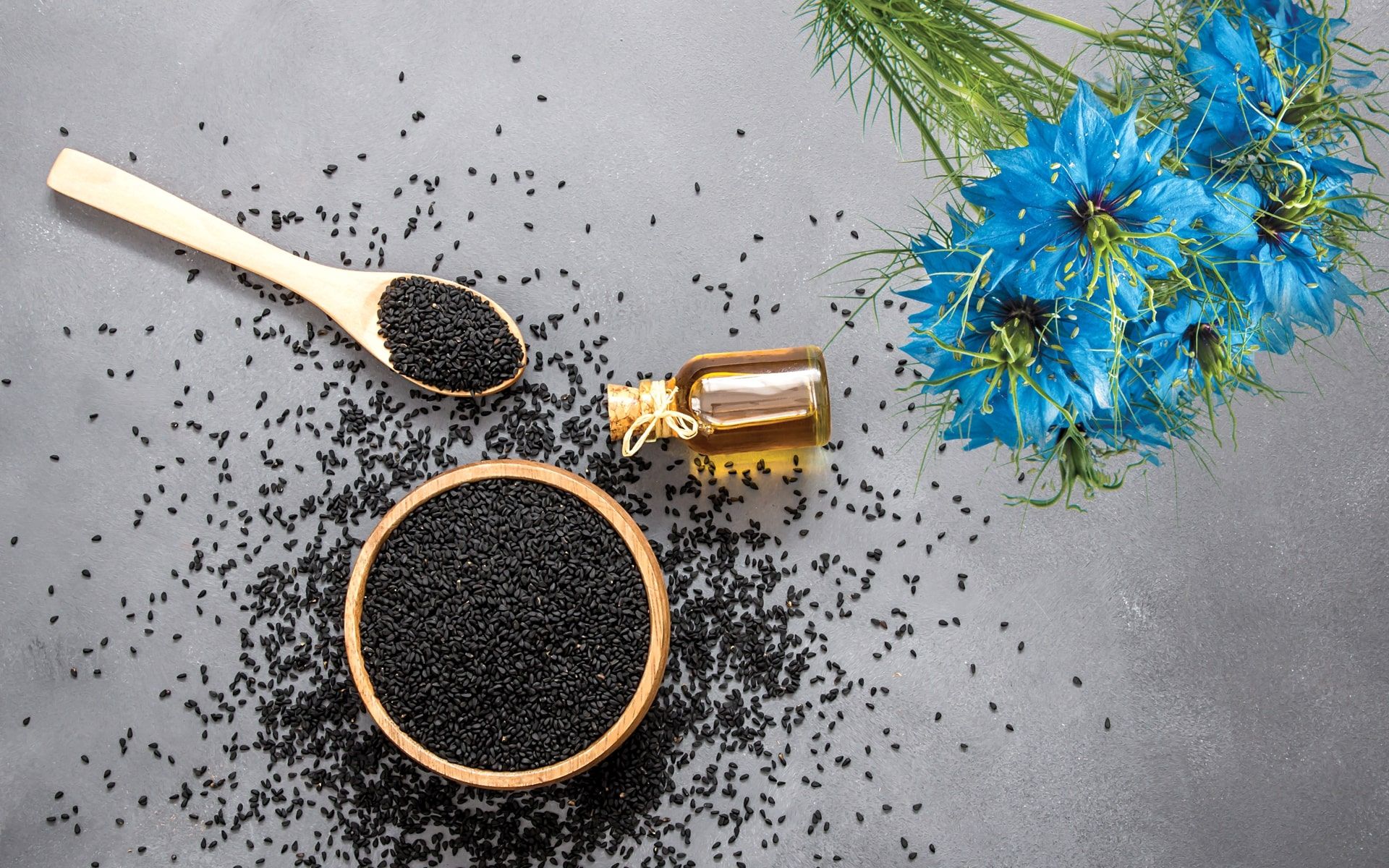Black Cumin

In This Article
-
The research on black cumin in biochemistry, organic chemistry, cytology has come up with interesting results.
-
Black cumin has many benefits for the most prevalent diseases of our time, including cardiovascular diseases and diabetes.
-
A study reported that black cumin was equipped with properties that are effective in killing various cancer cells and stimulating the production of antibodies targeting specific tumors.
“Black cumin is healing for all diseases except death.” Prophet Muhammad (pbuh)
Studies on the positive effects of black cumin have a long history. Even a simple list of the titles of these studies would take many pages. The research in the fields of modern biochemistry, organic chemistry, cytology (cell biology), and physiology has come up with interesting results.
One of these studies demonstrated that black cumin decreases the release of proteins IL-6, TNF-α, and NO by inhibiting pro-inflammatory T helper-1 cells which act as soldiers for our immune system, and has an anti-inflammatory effect by stimulating the number of protective cells that are released by our bone marrows, known as natural killers [1]. Another study found that it helps to increase the number of macrophages and neutrophiles which identify and destroy foreign materials and which must be found in certain amounts in our blood at all times, by stimulating the functioning of bone marrows and, as such, they perform immunomodulatory functions. As regards the autoimmune diseases, in which the immune system targets the cells of one's own body, black cumin acts differently and eliminates autoimmunity, thereby contributing to protection against, and prevention of, attacks [2].
The increase in allergic diseases in recent years has made physicians working in this field consider the potential effects of black cumin in treating these diseases. For the patients with food allergy, black cumin seeds were shown to result in a decrease in the number of mast cells that are found in intestines and considered as responsible for allergy symptoms, thereby reducing the disorders that emerge in connection with food allergy [3]. This applies to allergic asthma as well. During attack periods, it was determined that black cumin considerably alleviates the symptoms, results in improvements in pulmonary function tests and, as a prophylactic agent, leads to considerable decreases in the number of attacks [4].
Another study investigated the effects of black cumin in providing protection against, and decreasing, lung infections. This study found that it reduces lung inflammation, and prevents edema in pulmonary alveoli, which are instrumental in respiration, as well as fibrosis, which degrades lung tissues and results in decreased lung function. As it helps to increase the surfactants that reduce the tension between the gas inside the lungs and the liquid covering the interior of the lungs, thereby preventing pulmonary alveoli from shrinking and their interiors from clinging on to each other. Black cumin was found to be extremely precious for intensive care patients who have difficulty in breathing [5].
Nigella sativa has protective effects for the liver as well. As is known, the liver is like a laboratory which helps to clean our body and remove toxins. A number of dangerous wastes, such as foreign substances and toxins, are discharged from the body through the liver's perfectly designed cleaning methods. Black cumin facilitates the way substances that are considered carcinogenic are excreted through the liver and functions as an antioxidant [6].
Additionally, black cumin has many benefits also for the most prevalent diseases of our time, including cardiovascular diseases and diabetes. A study found that black cumin has prophylactic effects against heart attacks [7] while another study demonstrated that insulin levels, carbohydrate metabolism, and fasting glucose levels return to normal after consuming black cumin seeds or oil [8].
The wonders of black cumin are no new discovery, and people have long known the benefits of this amazing substance. The juice and oil of black cumin was determined to be effective against bugs, viruses, and bacteria. Its seeds contain small amounts of B1, B2, and B6 vitamins, protein-building amino acids, trace elements of iron, calcium, magnesium, zinc, and selenium that have significant metabolic functions in organisms. A study reported that black cumin was equipped with properties that are effective in killing various cancer cells and stimulating the production of antibodies targeting specific tumors. It is also reported that black cumin is not toxic to normal cells. ß-sitosterol, found in black cumin seeds, is a molecule that is capable of boosting secretory activity and lowering blood cholesterol levels. This molecule was reported to prevent prostate growth, have diuretic effects, lower blood pressure, promote lactation, stimulate one's appetite, induce menstruation, and have many other properties.
Its oil is known to be effective against dandruff and hair loss, and the volatile fatty acids it contains fight against bacteria, fungi and tapeworms.
Although there is no obvious method regarding the consumption of black cumin for protection or specific amount to be consumed, it is advised that its seeds should be ground in a wooden or porcelain mortar and mixed with honey or olive oil before being consumed on an empty stomach in the morning. People with good teeth may consume its seeds after chewing them thoroughly.
References
- Pichette, A. et al. Antioxidant, anti-inflammatory, anticancer and antibacterial activities of extracts from nigella sativa (black cumin) plant parts. J Food Biochem, 2012; 36(5): 53.
- Mohamed, A. et al. Amelioration of chronic relapsing experimental autoimmune encephalomyelitis (cr-eae) using thymoquinone-biomed 2009. Biomed Sci Instrum, 2009; 45: 274–279.
- Duncker, S.C. et al. Nigella sativa (Black Cumin) seed extract alleviates symptoms of allergic diarrhea in mice, involving opioid receptors. PLoS One, 2012; 7(6): e39841.
- Boskabady, M.H. et al. The possible prophylactic effect of Nigella sativa seed extract in asthmatic patients. Fundam Clin Pharmacol, 2007; 21(5): 559–566.
- Kanter, M. Effects of Nigella sativa seed extract on ameliorating lung tissue damage in rats after experimental pulmonary aspirations. Acta Histochem 2009; 111(5): 393–403.
- Zafeer, M.F. et al. Cadmium-induced hepatotoxicity and its abrogation by thymoquinone. J Biochem Mol Toxicol, 2012; 26(5): 199–205.
- Nemmar, A. et al. Contrasting actions of diesel exhaust particles on the pulmonary and cardiovascular systems and the effects of thymoquinone. Br J Pharmacol, 2011; 164(7): 1871–1882.
- Salama, R.H. Hypoglycemic effect of lipoic acid, carnitine and Nigella sativa in diabetic rat model. Int J Health Sci, 2011; 5(2): 126–134.









